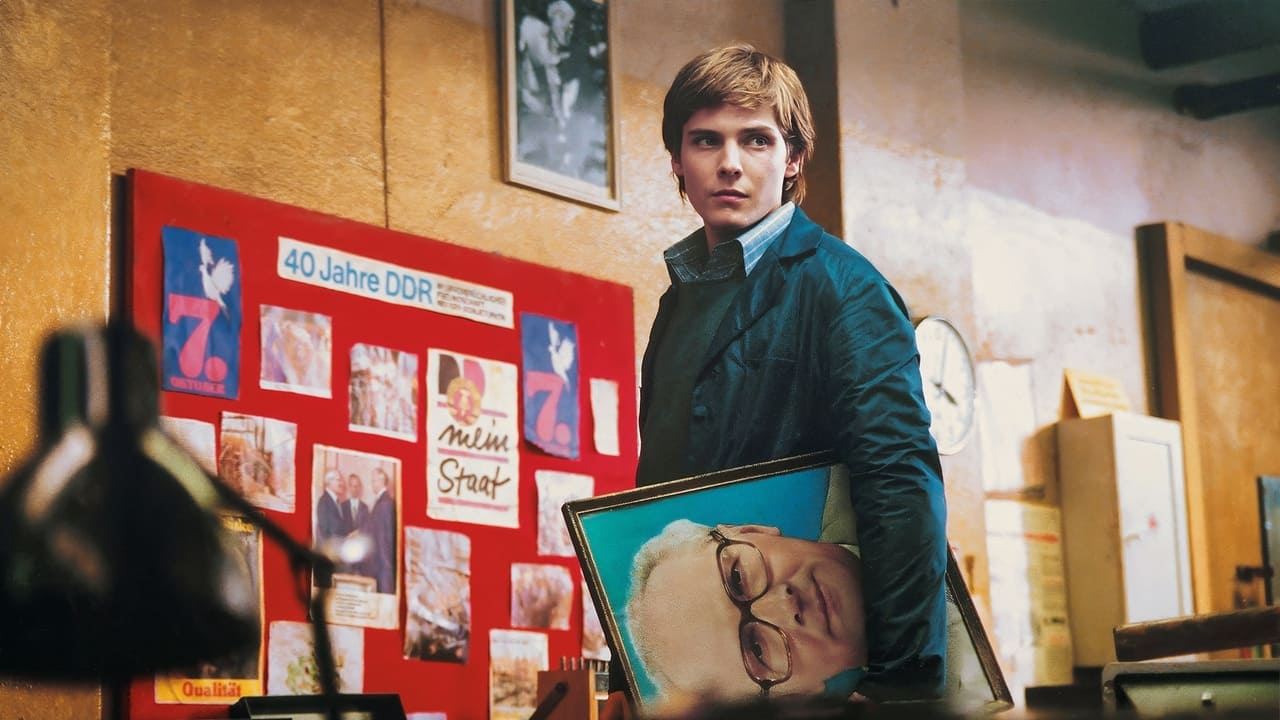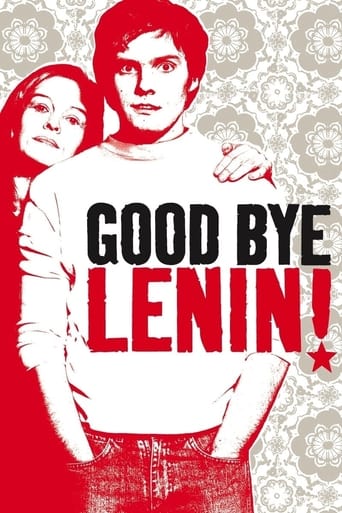



Very disappointed :(
Lack of good storyline.
A brilliant film that helped define a genre
The storyline feels a little thin and moth-eaten in parts but this sequel is plenty of fun.
View MoreI agree with many of the above comments. This film was very interesting. It had a deeper message than just the superficial, funny aspects of the movie. Viewers are able to learn about Germany during the time of the DDR. We also are able to empathize with Alex and wonder what we would do in a similar situation. Would we lie to our mom to protect her from having another heart attack or tell her that the wall came down? This movie not only asks us this moral question but we also see the dynamic between the various other relationships in the film. Alex's father leaves the family behind but he doesn't totally forget about them. He still writes letters which the mother hides. Was he a good father? Would he have come back if they would have written him back? Why did the mom hide the letters? Could the reason she hid the letters have to do with her newfound love: the DDR?
View MoreGood bye Lenin!In short, this film is about a son and daughter who go to increasingly inventive lengths to protect their mother from the cultural and social changes associated with the fall of the Berlin wall.Daniel Bruhl is superbly cast and #hulpan Khamatova is a fetching co-star who should really demand more screen time.A fascinating tale of a family dealing with the dynamism of political change Divorced Dads Cinema Club Rating 81% – A heartwarming and entertaining satire
View MoreWell, I must say I had no idea that life behind the wall during East Germany's existence was so restrictive. No Western companies allowed, (Coca Cola, etc) rubbish TV, mandatory conformation and if you tried to escape this hellhole, you were shot on sight. It almost makes North Korea sound appealing. Thank goodness all that is behind us... mind you, to be a complete nation again they had to tolerate David Hasselhoff's attempt at singing, which is almost enough to make you want to rebuild the structure just to keep the damn fool out...Into this situation are thrown a mother and her two teenage children, who she's raised to be devoted to the ethics and beliefs of the East. Her husband has long since fled to the cosseted bosom of the West, leaving her to raise the kids alone. This was just before the wall was about to collapse though, so she's holding onto a failing ideology. Just before the big event however, she suffers from a massive heart attack which puts her in a long coma, forcing her to miss Germany's reunification and subsequent corruption of her children by outside influences(!) When she wakes up months later, her son is informed by her doctor that any shock could kill her, and finding out the world as she knew it has changed would certainly fall into that category. So he is forced to begin an elaborate facade, involving VCRs, old clothes and pickles. Sounds complicated? Well, it is.It's also very moving, funny and poignant as the ever-inventive screenplay keeps throwing up new problems for the ever-industrious son to navigate, and the way he enlists the help of those around him and his utilisation of ancient products scavenged from the skip is a pleasure to behold. The true heart of the film though, is in the relationship between the stricken mother and her offspring, and through their efforts at keeping her breathing which disrupts their everyday lives, you know they truly love her. Even when she reveals the sorry truth about her husband's departure late on, they still forgive her with unconditional love. My favourite part is just before she passes on, she discovers the ruse... but frankly, she doesn't care. Watching the children she loves going to all this trouble to preserve her life is better than any send-off... you can tell by the look in her eyes.Beautiful. 7/10
View MoreOn the occasion of the passing of America's greatest film critic and Hollywood's greatest cheerleader, Roger Ebert, I wanted to reflect on whether his writing will stand the test of time. We often ask whether a given film will hold up, but what about a given review?My most recent screening had been of "Goodbye, Lenin!" (2004), Wolfgang Becker's historical- comical-tragical (as Polonius would have called it) story of a GDR loyalist whose son, once she emerges from a coma during which the Berlin Wall has fallen, doesn't dare break the news to her. Sure enough, Ebert had reviewed the German film. And so two extra layers of translation in which the message might be lost stacked with the one of interest to me: from the setting (1989) to the filming (2003), and from the filmmaker's audience (Germany) to Ebert's (the United States).Perhaps for the latter reason, the review is not among Ebert's longest or strongest. His wit is at its most inspired and devastating when fulminating over a train-wreck like Sex and the City 2: "I don't know a whole lot about fashion, but I know something about taste . . . ." With Lenin!, on the other hand, he admits being on his heels: "it is no doubt filled with references and in-jokes we do not quite understand." (More: http://www.rogerebert.com/reviews/goodbye-lenin-2004)But I think the most important thing that Ebert's review doesn't understand -- or, to be more fair, doesn't acknowledge -- is the thematic role of Christiane's (Kartis Sass) deception regarding her family's history and her relationship with the socialist party. Summing his criticism, Ebert writes: "What 'Goodbye, Lenin!' never quite deals with is the wrongheadedness of its heroine. . . . How many of us lie to our parents, pretending a world still exists that they believe in but we have long since moved away from?" But has Christiane's son Alex (Daniel Bruhl) really moved away? It seems rather credulous to believe that the extreme lengths he goes to to freeze his mom in historical stasis (even enlisting an ex-cosmonaut to create fake news broadcasts, as Ebert notes) are really for his mom's health (the doctor has admonished that she must have no surprises). Peering a bit beneath the surface, we surmise that all this play-acting is for Alex's own benefit, at least in part. Hence his concession that "the GDR I created for her increasingly became the one I dreamed of."If so, then it's congruent that it turns out not to be the case that her love affair with the party is the result of his with some Western strumpet (as we were led to believe), but rather that her husband's flight was the result of the party's betrayal of him -- and, by extension, her. On that reading, her loyalty is not just "emotional compensation" for his desertion, as Ebert suggests, but rather an outright charade, thus making her son's cocooning of her from the Good News all the more tragic. Thus, Becker's central theme is less about the folly of patronizing our parents in their antiquation, and more about the folly of catering to anyone when we don't actually know what they want.Even if I'm wrong, and Alex really is just trying to follow doctor's orders, the point still stands: he's trying to avoid giving her a negative shock, but it turns out that she might not take the news of the end of the GDR so negatively after all. Indeed, when he unspools to her his fabrication of the reunification -- replete with tales of West German refugees from capitalism flooding into their very neighborhood -- her concern seems less around the triumph of socialism and more around being helpful herself. (On that score, she's kindred spirits with Ebert, who drew strength and joy from his prolific writing for others' benefit, tweeted with abandon in spite of himself, and was known to scribble notes during screenings and rip them, page by page, from his notebook, to be gathered during the closing credits and assembled into his always- anticipated reviews.) One of her best punchlines -- "Coca Cola was a socialist invention?" -- sounds more in amazement than party pride.But, returning to my project, does this alleged missing of the mark have anything to do with the 9 years since Ebert's review? I don't think so. Whether Becker's point is better captured by Ebert's read or mine, the intervening period neither adds to nor subtracts from the audience's ability to find it. By choosing to film (Becker) and write about (Ebert) such enduring cultural touchstones as Coca Cola and Burger King, the two maximize the likelihood that they'll remain recognizable for future audiences. And, more importantly, by anchoring even more firmly on timeless themes (family more than fast food; "taste" more than "fashion"), the two maximize the likelihood that they'll remain relevant for them.
View More